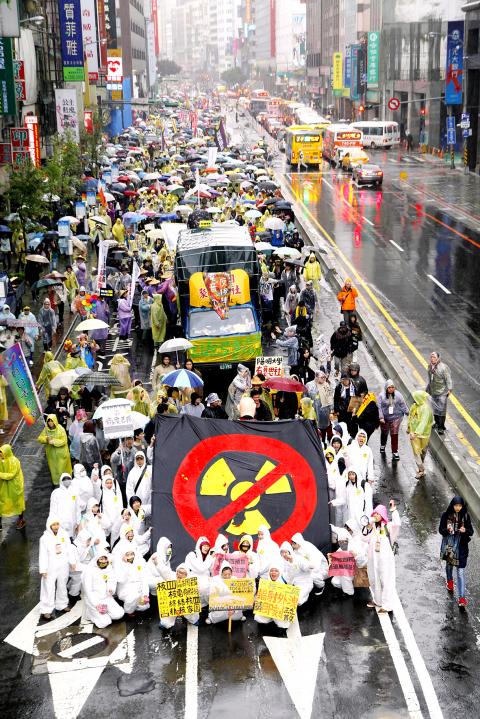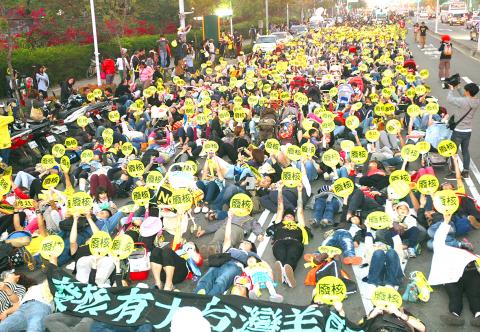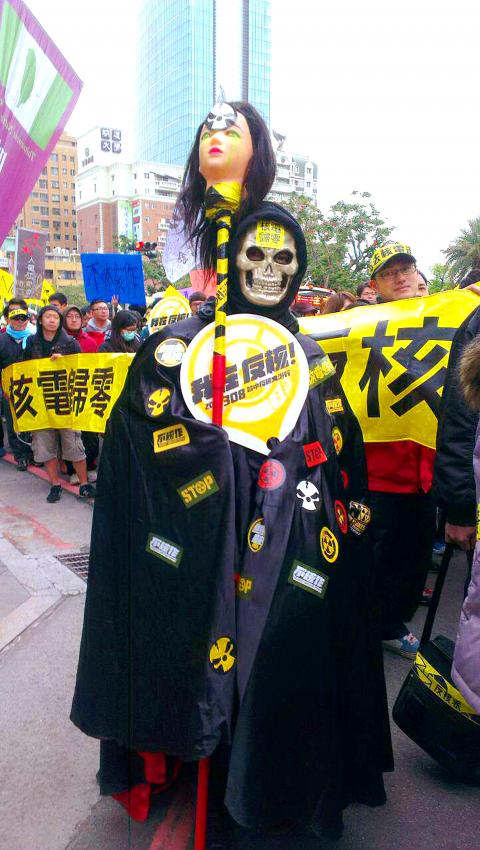Tens of thousands of people braved the rain yesterday afternoon to take part in nationwide demonstrations calling for an end to nuclear power plants in Taiwan.
The protests, staged three days ahead of the third anniversary of the Fukushima Dai-ichi nuclear disaster in Japan, took place simultaneously in Taipei, Greater Taichung, Greater Kaohsiung and Taitung.
The National Nuclear Abolition Action Platform — the event’s organizer, an alliance of more than 100 civic groups — demanded that the government immediately halt construction of the Fourth Nuclear Power Plant in New Taipei City’s Gongliao District (貢寮) and remove nuclear waste from Orchid Island (Lanyu, 蘭嶼).

Photo: EPA
The group asked lawmakers to cut the budget allocated for the new plant, pass a resolution calling for an end to nuclear power and amend the Referendum Act (公民投票法) to lower the referendum threshold.
In Taipei, a woman using a wheelchair held a handmade sign that read: “In a nuclear disaster, people in wheelchairs cannot escape,” while gender and gay rights advocacy groups held rainbow-colored signs that read: “We want orgasms, not nuclear waste” and “We may not have the same sexual preference, but we have the same anti-nuclear opinion.”
Dozens of young people danced to loud electronic dance music as they paraded while shouting: “My electro music does not want to use electricity generated by nuclear energy; my party does not fear oppressive authority.”

Photo: Huang Chih-yuan, Taipei Times
“How can I not stand up today,” said a 76-year-old fisherman surnamed Lu (盧) from New Taipei City’s Jinshan (金山), adding that he has lived in Jinshan all his life, with his home only about 5km from the plant, between two operating nuclear power plants.
“I didn’t know there were so many spent fuel rods in the plants until we had the chance to visit one of them, and I became worried, because the spent fuel pools are almost full. Will they take the fuel rods out of the water?” Lu said. “We have nowhere to run to if a disaster occurs and Taipei will be in danger.”
A highlight of the parade yesterday took place at the intersection of Zhongxiao W Road and Zhongshan S Road, where a group of residents living near nuclear facilities, young people, artists and civic groups stopped traffic by lying or sitting down on the road, as a fake nuclear accident siren sounded.

Photo: Hsu Kuo-chen, Taipei Times
The action prompted police intervention.
Green Citizens’ Action Alliance secretary-general Tsuei Su-hsin (崔愫欣) said that since the Fukushima Dai-ichi accident, annual anti-nuclear parades in Taiwan held in 2011, 2012 and last year all showed that most of the public are against nuclear power.
“The government is still stubbornly ignoring public opinion. When it wanted to push nuclear power, it said the policy was already decided and it was only acting according to the law, so people living near the facilities had no right to refuse. Now the government is using our tax money to threaten and lie to us, when it should communicate with the public and let us decide,” she said.
Tsuei said this year will be the beginning of a “citizens won’t cooperate” movement, which would make an oppressive government understand that “Taiwan doesn’t want nuclear power, the people can decide their own future.”
According to the event’s organizers, the Taipei protest drew more than 80,000 people, while other rallies held simultaneously across the country had a combined turnout of more than 50,000.
The nation has three active nuclear power plants that generate about 20 percent of its electricity.
The state-run Taiwan Power Co (Taipower, 台電) yesterday said that the Fourth Nuclear Power Plant will meet the highest safety standards before beginning operations.
Taipower vice president Chen Pu-tsan (陳布燦) said a safety review of the plant’s 126 systems is expected to be completed by the end of June, after which a report will be submitted to the Atomic Energy Council for review.
Chen stressed that passing safety inspections is just one of 75 requirements that the power plant needs to meet before fuel rods can be installed in its No. 1 reactor.
Additional reporting by AFP and CNA

MAKING WAVES: China’s maritime militia could become a nontraditional threat in war, clogging up shipping lanes to prevent US or Japanese intervention, a report said About 1,900 Chinese ships flying flags of convenience and fishing vessels that participated in China’s military exercises around Taiwan last month and in January last year have been listed for monitoring, Coast Guard Administration (CGA) Deputy Director-General Hsieh Ching-chin (謝慶欽) said yesterday. Following amendments to the Commercial Port Act (商港法) and the Law of Ships (船舶法) last month, the CGA can designate possible berthing areas or deny ports of call for vessels suspected of loitering around areas where undersea cables can be accessed, Oceans Affairs Council Minister Kuan Bi-ling (管碧玲) said. The list of suspected ships, originally 300, had risen to about

DAREDEVIL: Honnold said it had always been a dream of his to climb Taipei 101, while a Netflix producer said the skyscraper was ‘a real icon of this country’ US climber Alex Honnold yesterday took on Taiwan’s tallest building, becoming the first person to scale Taipei 101 without a rope, harness or safety net. Hundreds of spectators gathered at the base of the 101-story skyscraper to watch Honnold, 40, embark on his daredevil feat, which was also broadcast live on Netflix. Dressed in a red T-shirt and yellow custom-made climbing shoes, Honnold swiftly moved up the southeast face of the glass and steel building. At one point, he stepped onto a platform midway up to wave down at fans and onlookers who were taking photos. People watching from inside

Japan’s strategic alliance with the US would collapse if Tokyo were to turn away from a conflict in Taiwan, Japanese Prime Minister Sanae Takaichi said yesterday, but distanced herself from previous comments that suggested a possible military response in such an event. Takaichi expressed her latest views on a nationally broadcast TV program late on Monday, where an opposition party leader criticized her for igniting tensions with China with the earlier remarks. Ties between Japan and China have sunk to the worst level in years after Takaichi said in November that a hypothetical Chinese attack on Taiwan could bring about a Japanese

The WHO ignored early COVID-19 warnings from Taiwan, US Deputy Secretary of Health and Human Services Jim O’Neill said on Friday, as part of justification for Washington withdrawing from the global health body. US Secretary of State Marco Rubio on Thursday said that the US was pulling out of the UN agency, as it failed to fulfill its responsibilities during the COVID-19 pandemic. The WHO “ignored early COVID warnings from Taiwan in 2019 by pretending Taiwan did not exist, O’Neill wrote on X on Friday, Taiwan time. “It ignored rigorous science and promoted lockdowns.” The US will “continue international coordination on infectious